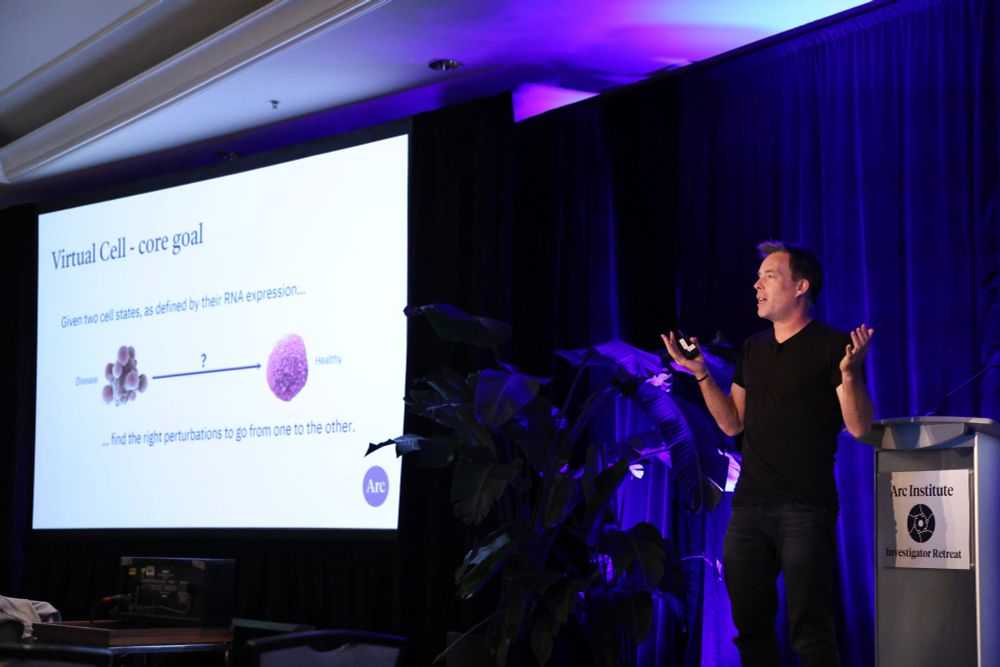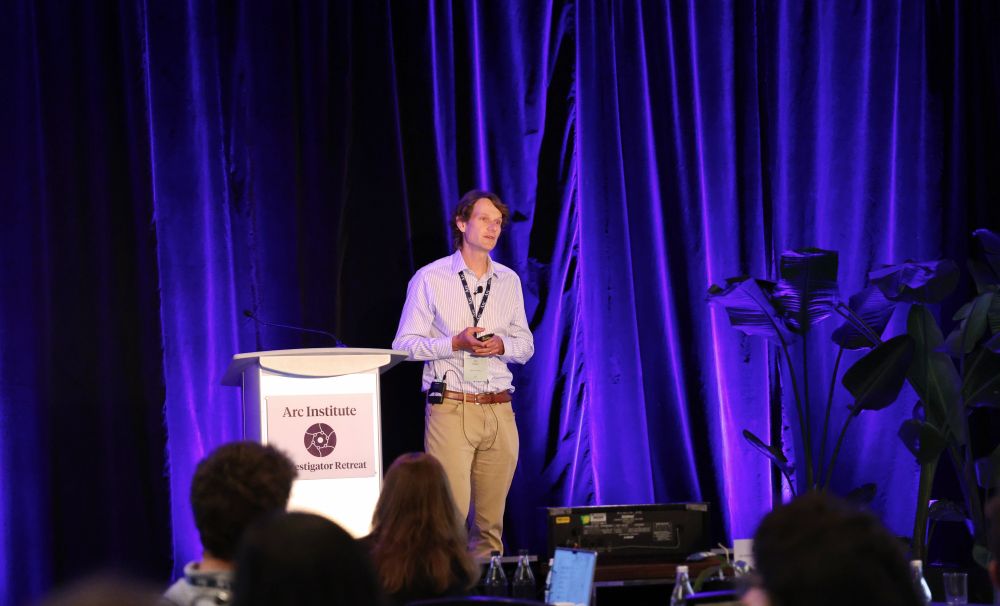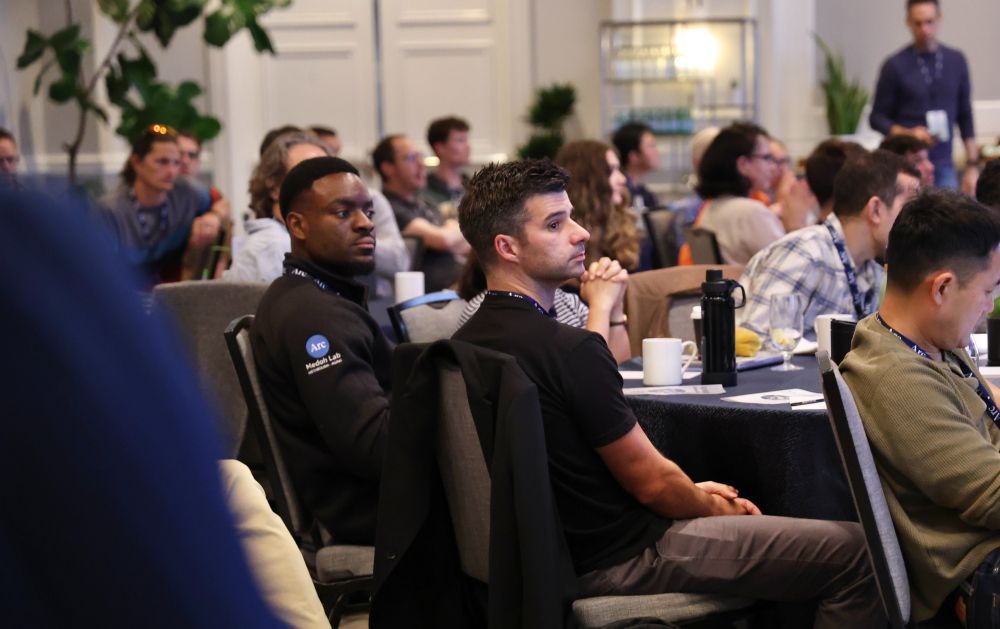
Brian Plosky
@brianplosky.bsky.social
Runner, cyclist, scientific publications at Arc Institute. Formerly EiC at Mol Cell. Opinions are mine.
Reposted by Brian Plosky
A true legend.
www.bcm.edu/about-us/lea...
www.bcm.edu/about-us/lea...

In Memoriam: Bert W. O'Malley, M.D.
In Memoriam: Bert W. O'Malley, M.D....
www.bcm.edu
November 11, 2025 at 7:00 PM
A true legend.
www.bcm.edu/about-us/lea...
www.bcm.edu/about-us/lea...
Reposted by Brian Plosky
Work published today in @natbiotech.nature.com from Arc’s Luke Gilbert and Patrick Hsu labs presents a new way to insert large DNA sequences into the genome using engineered recombinases that don’t require DNA cutting or rely on the cell's repair machinery.

November 6, 2025 at 5:46 PM
Work published today in @natbiotech.nature.com from Arc’s Luke Gilbert and Patrick Hsu labs presents a new way to insert large DNA sequences into the genome using engineered recombinases that don’t require DNA cutting or rely on the cell's repair machinery.
Coincidental juxtaposition of SNARE with the wrong kind of SNAP in my other feed:

November 5, 2025 at 12:21 AM
Coincidental juxtaposition of SNARE with the wrong kind of SNAP in my other feed:
Like the Monkey’s Paw—be careful what you wish for!
November 4, 2025 at 3:27 PM
Like the Monkey’s Paw—be careful what you wish for!
Reposted by Brian Plosky
I've updated the BINSEQ manuscript to stay up to date with changes since I originally put it out at the beginning of the year
Some notable changes:
1. Support for ambiguous bases with 4bit encoding
2. Support for sequence headers
3. Improved API
www.biorxiv.org/content/10.1...
Some notable changes:
1. Support for ambiguous bases with 4bit encoding
2. Support for sequence headers
3. Improved API
www.biorxiv.org/content/10.1...

BINSEQ: A Family of High-Performance Binary Formats for Nucleotide Sequences
Modern genomics produces billions of sequencing records per run, which are typically stored as gzip-compressed FASTQ files. While this format is widely used, it is not optimal for high-throughput proc...
www.biorxiv.org
October 29, 2025 at 8:41 PM
I've updated the BINSEQ manuscript to stay up to date with changes since I originally put it out at the beginning of the year
Some notable changes:
1. Support for ambiguous bases with 4bit encoding
2. Support for sequence headers
3. Improved API
www.biorxiv.org/content/10.1...
Some notable changes:
1. Support for ambiguous bases with 4bit encoding
2. Support for sequence headers
3. Improved API
www.biorxiv.org/content/10.1...
Reposted by Brian Plosky
Welcome to our 9th Core Investigator and first physician-scientist, John Pluvinage. His team investigates the hidden overlap between autoimmunity and neurodegeneration, developing targeted treatments for mysterious neurological cases and common dementias.

October 29, 2025 at 3:25 PM
Welcome to our 9th Core Investigator and first physician-scientist, John Pluvinage. His team investigates the hidden overlap between autoimmunity and neurodegeneration, developing targeted treatments for mysterious neurological cases and common dementias.
Reposted by Brian Plosky
Arc Core Investigator @genophoria.bsky.social will speak on a free, online panel with @tkaraletsos.bsky.social, @emmalundberg.bsky.social, and @ronalfa.bsky.social on Wed., Oct. 29, as part of GENbio's “The State of AI in Drug Discovery in 2025.” Register at: webinars.liebertpub.com/e/the-state-...

October 24, 2025 at 5:32 PM
Arc Core Investigator @genophoria.bsky.social will speak on a free, online panel with @tkaraletsos.bsky.social, @emmalundberg.bsky.social, and @ronalfa.bsky.social on Wed., Oct. 29, as part of GENbio's “The State of AI in Drug Discovery in 2025.” Register at: webinars.liebertpub.com/e/the-state-...
Just tried this out on a couple of preprints, and this seems legit! Only minor issue so far is the Word file for the plan not opening. Also, it seems that AI x Bio is not a fully supported domain yet. But nice that it prominently acknowledged that!
BIG ANNOUNCEMENT📣: I haven’t been this excited to be part of something new in 15 years… Thrilled to reveal the passion project I’ve been working on for the past year and a half!🙀🥳 (thread 👇)

October 16, 2025 at 2:39 PM
Just tried this out on a couple of preprints, and this seems legit! Only minor issue so far is the Word file for the plan not opening. Also, it seems that AI x Bio is not a fully supported domain yet. But nice that it prominently acknowledged that!
Reposted by Brian Plosky
Hear how Arc, Ultima Genomics, and @10xgenomics.bsky.social are partnering to generate perturbation data at the scale needed to train virtual cell models on The Bio Report podcast with guests @genophoria.bsky.social, Gilad Almogy, and
Serge Saxonov: thebioreport.podbean.com/e/transformi...
Serge Saxonov: thebioreport.podbean.com/e/transformi...

October 9, 2025 at 4:51 PM
Hear how Arc, Ultima Genomics, and @10xgenomics.bsky.social are partnering to generate perturbation data at the scale needed to train virtual cell models on The Bio Report podcast with guests @genophoria.bsky.social, Gilad Almogy, and
Serge Saxonov: thebioreport.podbean.com/e/transformi...
Serge Saxonov: thebioreport.podbean.com/e/transformi...
Reposted by Brian Plosky
Arc is looking for an outstanding early-career scientist to be our next Science Fellow. This program provides resources and freedom for those looking to transition into a principal investigator role immediately after doctoral training. Apply here: arcinstitute.org/programs/sea...

October 13, 2025 at 7:36 PM
Arc is looking for an outstanding early-career scientist to be our next Science Fellow. This program provides resources and freedom for those looking to transition into a principal investigator role immediately after doctoral training. Apply here: arcinstitute.org/programs/sea...
Reposted by Brian Plosky
For decades, human genome editing has been limited to small, localized modifications.
Today, in a new paper published in @science.org , researchers from Arc's Hsu lab show that bridge recombinase technology is capable of large-scale genomic rearrangements in human cells.
Today, in a new paper published in @science.org , researchers from Arc's Hsu lab show that bridge recombinase technology is capable of large-scale genomic rearrangements in human cells.

September 25, 2025 at 6:27 PM
For decades, human genome editing has been limited to small, localized modifications.
Today, in a new paper published in @science.org , researchers from Arc's Hsu lab show that bridge recombinase technology is capable of large-scale genomic rearrangements in human cells.
Today, in a new paper published in @science.org , researchers from Arc's Hsu lab show that bridge recombinase technology is capable of large-scale genomic rearrangements in human cells.
Reposted by Brian Plosky
In another preprint from the @brianhie.bsky.social Lab and @synbiogaolab.bsky.social, they introduce Germinal, a generative AI system for de novo antibody design.
Germinal produces functional nanobodies in just dozens of tests, making custom antibody design more accessible than ever before.
Germinal produces functional nanobodies in just dozens of tests, making custom antibody design more accessible than ever before.

September 24, 2025 at 3:07 PM
In another preprint from the @brianhie.bsky.social Lab and @synbiogaolab.bsky.social, they introduce Germinal, a generative AI system for de novo antibody design.
Germinal produces functional nanobodies in just dozens of tests, making custom antibody design more accessible than ever before.
Germinal produces functional nanobodies in just dozens of tests, making custom antibody design more accessible than ever before.
Reposted by Brian Plosky
New work from Arc's @pauldatlinger.bsky.social of our Genome Engineering Technology Center. Congrats!
CAR T cells showcase the enormous potential of cell therapies, but often fail due to lack of evolutionary optimization. Today in @nature.com , we use #CELLFIE to engineer cell therapies at scale and share the largest resource of CRISPR screens in CAR T cells. www.nature.com/articles/s41...

Systematic discovery of CRISPR-boosted CAR T cell immunotherapies - Nature
CELLFIE, a CRISPR platform for optimizing cell-based immunotherapies, identifies gene knockouts that enhance CAR T cell efficacy using in vitro and in vivo screens.
www.nature.com
September 24, 2025 at 11:53 PM
New work from Arc's @pauldatlinger.bsky.social of our Genome Engineering Technology Center. Congrats!
Reposted by Brian Plosky
Many of the most complex and useful functions in biology emerge at the scale of whole genomes.
Today, we share our preprint “Generative design of novel bacteriophages with genome language models”, where we validate the first, functional AI-generated genomes 🧵
Today, we share our preprint “Generative design of novel bacteriophages with genome language models”, where we validate the first, functional AI-generated genomes 🧵
September 17, 2025 at 3:03 PM
Many of the most complex and useful functions in biology emerge at the scale of whole genomes.
Today, we share our preprint “Generative design of novel bacteriophages with genome language models”, where we validate the first, functional AI-generated genomes 🧵
Today, we share our preprint “Generative design of novel bacteriophages with genome language models”, where we validate the first, functional AI-generated genomes 🧵
Reposted by Brian Plosky
In a new preprint from @brianhie.bsky.social's lab, the team reports the first generative design of viable bacteriophage genomes.
Leveraging Evo 1 & Evo 2, they generated whole genome sequences, resulting in 16 viable phages with distinct genomic architectures.
Leveraging Evo 1 & Evo 2, they generated whole genome sequences, resulting in 16 viable phages with distinct genomic architectures.

September 17, 2025 at 3:12 PM
In a new preprint from @brianhie.bsky.social's lab, the team reports the first generative design of viable bacteriophage genomes.
Leveraging Evo 1 & Evo 2, they generated whole genome sequences, resulting in 16 viable phages with distinct genomic architectures.
Leveraging Evo 1 & Evo 2, they generated whole genome sequences, resulting in 16 viable phages with distinct genomic architectures.
Reposted by Brian Plosky
"It is a big loss for Nature Methods and its audience. I think your role there in the past decade has transformed and re-defined the imaging related landscape for the entire community." 😭 These notes make me sentimental, but they also show me that doing this job well matters. #editorgoals
September 15, 2025 at 4:17 PM
"It is a big loss for Nature Methods and its audience. I think your role there in the past decade has transformed and re-defined the imaging related landscape for the entire community." 😭 These notes make me sentimental, but they also show me that doing this job well matters. #editorgoals
Reposted by Brian Plosky
Vaccines are safe and effective. RFK Jr. isn’t.
August 28, 2025 at 1:43 AM
Vaccines are safe and effective. RFK Jr. isn’t.
Reposted by Brian Plosky
JOB ALERT 🚨 We are hiring TWO principal investigators in cell, molecular, systems, or chemical biology in Toronto, Canada at @sinaihealth.bsky.social. We provide a generous startup, fully funded salary and academic appointment at U of Toronto.
www.nature.com/naturecareer...
Please repost!
www.nature.com/naturecareer...
Please repost!

August 28, 2025 at 6:34 AM
JOB ALERT 🚨 We are hiring TWO principal investigators in cell, molecular, systems, or chemical biology in Toronto, Canada at @sinaihealth.bsky.social. We provide a generous startup, fully funded salary and academic appointment at U of Toronto.
www.nature.com/naturecareer...
Please repost!
www.nature.com/naturecareer...
Please repost!
Reposted by Brian Plosky
In this blog post from Arc scientists, learn about some of the decisions that went into the dataset and three-metric evaluation framework developed for the first Virtual Cell Challenge.
arcinstitute.org/news/behind-...
arcinstitute.org/news/behind-...

Behind the Data of the Virtual Cell Challenge | Arc Institute
To enable meaningful model comparison in the Virtual Cell Challenge, we needed more than just a new Perturb-seq dataset; we needed a high-quality and high-fidelity benchmark. This required us to make ...
arcinstitute.org
August 22, 2025 at 7:17 PM
In this blog post from Arc scientists, learn about some of the decisions that went into the dataset and three-metric evaluation framework developed for the first Virtual Cell Challenge.
arcinstitute.org/news/behind-...
arcinstitute.org/news/behind-...
Reposted by Brian Plosky
I don’t know who needs this right now, but I really enjoy browsing “Paper Skygest”, a feed of posts on academic papers *from people you follow*. I think it’s what a lot of us are actually here for
August 6, 2025 at 11:35 AM
I don’t know who needs this right now, but I really enjoy browsing “Paper Skygest”, a feed of posts on academic papers *from people you follow*. I think it’s what a lot of us are actually here for
Reposted by Brian Plosky
I have an idea… journals.plos.org/plosbiology/...
July 30, 2025 at 6:38 PM
I have an idea… journals.plos.org/plosbiology/...
Reposted by Brian Plosky
To help competitors get started, our team created a Colab notebook that guides participants through training and running inference on an ML model. For this example we started with STATE, the recently released model from Arc: colab.research.google.com/drive/1QKOtY...

Google Colab
colab.research.google.com
July 25, 2025 at 9:32 PM
To help competitors get started, our team created a Colab notebook that guides participants through training and running inference on an ML model. For this example we started with STATE, the recently released model from Arc: colab.research.google.com/drive/1QKOtY...
Reposted by Brian Plosky
Over 2,000 people have registered for the Virtual Cell Challenge to create an AI model that can generalize for unseen perturbations. Hundreds of competitors have been submitting results from their models and the race, as you can see from the leaderboard, is heating up:

July 25, 2025 at 9:32 PM
Over 2,000 people have registered for the Virtual Cell Challenge to create an AI model that can generalize for unseen perturbations. Hundreds of competitors have been submitting results from their models and the race, as you can see from the leaderboard, is heating up:
Reposted by Brian Plosky
The Arc Institute Investigator Retreat is off to a great start! Huge thanks to Dave Burke and @brianhie.bsky.social for for sharing their computational research, and to Isha Jain, Will Allen, Faranak Fattahi, and Alex Pollen for diving into cell biology and neuroscience.



July 17, 2025 at 4:15 PM
The Arc Institute Investigator Retreat is off to a great start! Huge thanks to Dave Burke and @brianhie.bsky.social for for sharing their computational research, and to Isha Jain, Will Allen, Faranak Fattahi, and Alex Pollen for diving into cell biology and neuroscience.
Reposted by Brian Plosky
Our 2nd Investigator Retreat wrapped up with talks from Core Investigators Christoph Thaiss and Felix Horns, our incoming Science Fellow Maya Arce, and some of our Innovation Investigators and Ignite Awardees. We look forward to seeing how the connections made this week turn into new collaborations.




July 19, 2025 at 2:46 AM
Our 2nd Investigator Retreat wrapped up with talks from Core Investigators Christoph Thaiss and Felix Horns, our incoming Science Fellow Maya Arce, and some of our Innovation Investigators and Ignite Awardees. We look forward to seeing how the connections made this week turn into new collaborations.


